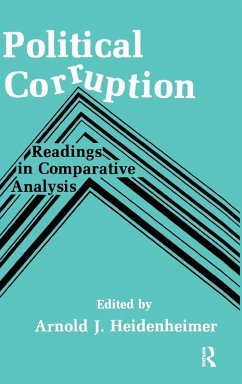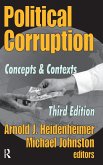Political Corruption
Readings in Comparative Analysis
Herausgeber: Johnston, Michael
Political Corruption
Readings in Comparative Analysis
Herausgeber: Johnston, Michael
- Gebundenes Buch
- Merkliste
- Auf die Merkliste
- Bewerten Bewerten
- Teilen
- Produkt teilen
- Produkterinnerung
- Produkterinnerung
Corruption is once again high on the international policy agenda as a result of globalization, the spread of democracy, and major scandals and reform initiatives
Andere Kunden interessierten sich auch für
![Political Corruption in Comparative Perspective Political Corruption in Comparative Perspective]() Political Corruption in Comparative Perspective195,99 €
Political Corruption in Comparative Perspective195,99 €![Comparing Political Corruption and Clientelism Comparing Political Corruption and Clientelism]() Comparing Political Corruption and Clientelism206,99 €
Comparing Political Corruption and Clientelism206,99 €![Political Corruption Political Corruption]() Political Corruption209,99 €
Political Corruption209,99 €![Routledge Handbook of Political Corruption Routledge Handbook of Political Corruption]() Routledge Handbook of Political Corruption284,99 €
Routledge Handbook of Political Corruption284,99 €![Postmarks from a Political Traveler Postmarks from a Political Traveler]() Phil KarberPostmarks from a Political Traveler226,99 €
Phil KarberPostmarks from a Political Traveler226,99 €![Political Culture and Participation in Rural China Political Culture and Participation in Rural China]() Yang ZhongPolitical Culture and Participation in Rural China195,99 €
Yang ZhongPolitical Culture and Participation in Rural China195,99 €![The Political Economy of the Arab Uprisings The Political Economy of the Arab Uprisings]() Melani CammettThe Political Economy of the Arab Uprisings184,99 €
Melani CammettThe Political Economy of the Arab Uprisings184,99 €-
-
-
Corruption is once again high on the international policy agenda as a result of globalization, the spread of democracy, and major scandals and reform initiatives
Hinweis: Dieser Artikel kann nur an eine deutsche Lieferadresse ausgeliefert werden.
Hinweis: Dieser Artikel kann nur an eine deutsche Lieferadresse ausgeliefert werden.
Produktdetails
- Produktdetails
- Verlag: Routledge
- 2. Auflage
- Seitenzahl: 594
- Erscheinungstermin: 15. November 2017
- Englisch
- Abmessung: 235mm x 157mm x 36mm
- Gewicht: 999g
- ISBN-13: 9781138530133
- ISBN-10: 1138530131
- Artikelnr.: 50859374
- Herstellerkennzeichnung
- Libri GmbH
- Europaallee 1
- 36244 Bad Hersfeld
- gpsr@libri.de
- Verlag: Routledge
- 2. Auflage
- Seitenzahl: 594
- Erscheinungstermin: 15. November 2017
- Englisch
- Abmessung: 235mm x 157mm x 36mm
- Gewicht: 999g
- ISBN-13: 9781138530133
- ISBN-10: 1138530131
- Artikelnr.: 50859374
- Herstellerkennzeichnung
- Libri GmbH
- Europaallee 1
- 36244 Bad Hersfeld
- gpsr@libri.de
Michael Johnston
1: The Context of Analysis
1: Definitions, Concepts, and Criteria
1: What Is the Problem about Corruption?
2: The Concept of Corruption 1
3: The Sociology of Corruption
4: Techniques of Political Graft
5: The Definition of Corruption
6: The Nature of Political Corruption
7: Black-Market Bureaucracy
2: The Evolution of Public-Office Concepts and Rules
8: Corruption as a Historical Phenomenon
9: Performance Levels and Bureaucratic Structures
10: The Sale of Public Offices
11: Bureaucratic Institutionalization in Nineteenth Century Europe
12: Patronage and the Public Service: Jeffersonian Bureaucracy and the British Tradition
3: Behavioral and Normative Perspectives on the "Incidence" of Corruption
13: The Moral Basis of a Backward Society
14: Patronage In Sicily 1
15: Village Friendship and Patronage
16: Crime and Mobility among Italian-Americans
17: The Politics of Corruption in an American City
18: Ticket-Fixing in Massachusetts
2: The Analysis of Administrative Corruption
4: South and Southeast Asia
19: Sociological Aspects of Corruption in Southeast Asia 1
20: The "Sala Model" and Comparative Administration
21: The Dimensions of Corruption in India
22: Corruption as a Hindrance to Modernization in South Asia
5: Contemporary Europe
23: Administrative Corruption in Theory and Dutch Practice
24: The British Method of Dealing with Political Corruption
25: The Decline of the Bureaucratic Ethos in the Federal Republic
6: The United States
26: Corruption: The Special Case of the United States
27: Spoilsmen and Reformers: Civil Service Reform and Public Morality
28: Municipal Corruption: A Comment on Lincoln Steffens 1
29: A Theory about Corruption
30: Corruption: The Shame of the States
31: The Purity Potlatch: Conflict of Interests and Moral Escalation
7: Africa
32: Corruption in the Public Services of British Colonies and Ex-Colonies in West Africa
33: Nepotism and Bribery in West Africa
34: New States and the Concept of Corruption
35: Kleptocracy as a System of Government in Africa
3: The Analysis of Electoral and Legislative Corruption
8: Western Europe
36: How the Government Won Elections under Napoleon III
37: Socioeconomic Development and the Incidence of English Corrupt Campaign Practices
38: The Nature and Decline of Corrupt Election Expenditures in Nineteenth-Century Britain
39: German Attempts at the Legal Definition of Parliamentary Corruption
9: The United States
40: The Alarming Proportion of Venal Voters in Connecticut
41: The Purchase of Votes in New York City
42: The City Boss: Game Politician or Gain Politician
43: Congressional Ethics and the Conflict of Interest Issue
44: 44.Group Politics and the Disclosure Idea
10: The Developing Nations
45: Bribery in the Election of Ashanti Chiefs
46: Remuneration Levels and Corruption in French-Speaking Africa
47: Corruption and Self-Interest in Kampala and Nairobi
48: The Peso Price of Politics in the Philippines
4: Corruption and Modernization
11: Assessing Effects, Toxic and Tonic
49: Towards a Grammar of Graft
50: Modernization and Corruption
51: Apologies for Political Corruption
52: Economic Development through Bureaucratic Corruption 1
53: The Effects of Corruption in a Developing Nation
54: The Contribution of Nepotism, Spoils, and Graft to Political Development
55: Corruption: Its Causes and Effects
56: Bureaucracy versus Kleptocracy
57: Corruption, Machine Politics, and Political Change
58: Corruption and Political Development: A Cost-Benefit Analysis
1: Definitions, Concepts, and Criteria
1: What Is the Problem about Corruption?
2: The Concept of Corruption 1
3: The Sociology of Corruption
4: Techniques of Political Graft
5: The Definition of Corruption
6: The Nature of Political Corruption
7: Black-Market Bureaucracy
2: The Evolution of Public-Office Concepts and Rules
8: Corruption as a Historical Phenomenon
9: Performance Levels and Bureaucratic Structures
10: The Sale of Public Offices
11: Bureaucratic Institutionalization in Nineteenth Century Europe
12: Patronage and the Public Service: Jeffersonian Bureaucracy and the British Tradition
3: Behavioral and Normative Perspectives on the "Incidence" of Corruption
13: The Moral Basis of a Backward Society
14: Patronage In Sicily 1
15: Village Friendship and Patronage
16: Crime and Mobility among Italian-Americans
17: The Politics of Corruption in an American City
18: Ticket-Fixing in Massachusetts
2: The Analysis of Administrative Corruption
4: South and Southeast Asia
19: Sociological Aspects of Corruption in Southeast Asia 1
20: The "Sala Model" and Comparative Administration
21: The Dimensions of Corruption in India
22: Corruption as a Hindrance to Modernization in South Asia
5: Contemporary Europe
23: Administrative Corruption in Theory and Dutch Practice
24: The British Method of Dealing with Political Corruption
25: The Decline of the Bureaucratic Ethos in the Federal Republic
6: The United States
26: Corruption: The Special Case of the United States
27: Spoilsmen and Reformers: Civil Service Reform and Public Morality
28: Municipal Corruption: A Comment on Lincoln Steffens 1
29: A Theory about Corruption
30: Corruption: The Shame of the States
31: The Purity Potlatch: Conflict of Interests and Moral Escalation
7: Africa
32: Corruption in the Public Services of British Colonies and Ex-Colonies in West Africa
33: Nepotism and Bribery in West Africa
34: New States and the Concept of Corruption
35: Kleptocracy as a System of Government in Africa
3: The Analysis of Electoral and Legislative Corruption
8: Western Europe
36: How the Government Won Elections under Napoleon III
37: Socioeconomic Development and the Incidence of English Corrupt Campaign Practices
38: The Nature and Decline of Corrupt Election Expenditures in Nineteenth-Century Britain
39: German Attempts at the Legal Definition of Parliamentary Corruption
9: The United States
40: The Alarming Proportion of Venal Voters in Connecticut
41: The Purchase of Votes in New York City
42: The City Boss: Game Politician or Gain Politician
43: Congressional Ethics and the Conflict of Interest Issue
44: 44.Group Politics and the Disclosure Idea
10: The Developing Nations
45: Bribery in the Election of Ashanti Chiefs
46: Remuneration Levels and Corruption in French-Speaking Africa
47: Corruption and Self-Interest in Kampala and Nairobi
48: The Peso Price of Politics in the Philippines
4: Corruption and Modernization
11: Assessing Effects, Toxic and Tonic
49: Towards a Grammar of Graft
50: Modernization and Corruption
51: Apologies for Political Corruption
52: Economic Development through Bureaucratic Corruption 1
53: The Effects of Corruption in a Developing Nation
54: The Contribution of Nepotism, Spoils, and Graft to Political Development
55: Corruption: Its Causes and Effects
56: Bureaucracy versus Kleptocracy
57: Corruption, Machine Politics, and Political Change
58: Corruption and Political Development: A Cost-Benefit Analysis
1: The Context of Analysis
1: Definitions, Concepts, and Criteria
1: What Is the Problem about Corruption?
2: The Concept of Corruption 1
3: The Sociology of Corruption
4: Techniques of Political Graft
5: The Definition of Corruption
6: The Nature of Political Corruption
7: Black-Market Bureaucracy
2: The Evolution of Public-Office Concepts and Rules
8: Corruption as a Historical Phenomenon
9: Performance Levels and Bureaucratic Structures
10: The Sale of Public Offices
11: Bureaucratic Institutionalization in Nineteenth Century Europe
12: Patronage and the Public Service: Jeffersonian Bureaucracy and the British Tradition
3: Behavioral and Normative Perspectives on the "Incidence" of Corruption
13: The Moral Basis of a Backward Society
14: Patronage In Sicily 1
15: Village Friendship and Patronage
16: Crime and Mobility among Italian-Americans
17: The Politics of Corruption in an American City
18: Ticket-Fixing in Massachusetts
2: The Analysis of Administrative Corruption
4: South and Southeast Asia
19: Sociological Aspects of Corruption in Southeast Asia 1
20: The "Sala Model" and Comparative Administration
21: The Dimensions of Corruption in India
22: Corruption as a Hindrance to Modernization in South Asia
5: Contemporary Europe
23: Administrative Corruption in Theory and Dutch Practice
24: The British Method of Dealing with Political Corruption
25: The Decline of the Bureaucratic Ethos in the Federal Republic
6: The United States
26: Corruption: The Special Case of the United States
27: Spoilsmen and Reformers: Civil Service Reform and Public Morality
28: Municipal Corruption: A Comment on Lincoln Steffens 1
29: A Theory about Corruption
30: Corruption: The Shame of the States
31: The Purity Potlatch: Conflict of Interests and Moral Escalation
7: Africa
32: Corruption in the Public Services of British Colonies and Ex-Colonies in West Africa
33: Nepotism and Bribery in West Africa
34: New States and the Concept of Corruption
35: Kleptocracy as a System of Government in Africa
3: The Analysis of Electoral and Legislative Corruption
8: Western Europe
36: How the Government Won Elections under Napoleon III
37: Socioeconomic Development and the Incidence of English Corrupt Campaign Practices
38: The Nature and Decline of Corrupt Election Expenditures in Nineteenth-Century Britain
39: German Attempts at the Legal Definition of Parliamentary Corruption
9: The United States
40: The Alarming Proportion of Venal Voters in Connecticut
41: The Purchase of Votes in New York City
42: The City Boss: Game Politician or Gain Politician
43: Congressional Ethics and the Conflict of Interest Issue
44: 44.Group Politics and the Disclosure Idea
10: The Developing Nations
45: Bribery in the Election of Ashanti Chiefs
46: Remuneration Levels and Corruption in French-Speaking Africa
47: Corruption and Self-Interest in Kampala and Nairobi
48: The Peso Price of Politics in the Philippines
4: Corruption and Modernization
11: Assessing Effects, Toxic and Tonic
49: Towards a Grammar of Graft
50: Modernization and Corruption
51: Apologies for Political Corruption
52: Economic Development through Bureaucratic Corruption 1
53: The Effects of Corruption in a Developing Nation
54: The Contribution of Nepotism, Spoils, and Graft to Political Development
55: Corruption: Its Causes and Effects
56: Bureaucracy versus Kleptocracy
57: Corruption, Machine Politics, and Political Change
58: Corruption and Political Development: A Cost-Benefit Analysis
1: Definitions, Concepts, and Criteria
1: What Is the Problem about Corruption?
2: The Concept of Corruption 1
3: The Sociology of Corruption
4: Techniques of Political Graft
5: The Definition of Corruption
6: The Nature of Political Corruption
7: Black-Market Bureaucracy
2: The Evolution of Public-Office Concepts and Rules
8: Corruption as a Historical Phenomenon
9: Performance Levels and Bureaucratic Structures
10: The Sale of Public Offices
11: Bureaucratic Institutionalization in Nineteenth Century Europe
12: Patronage and the Public Service: Jeffersonian Bureaucracy and the British Tradition
3: Behavioral and Normative Perspectives on the "Incidence" of Corruption
13: The Moral Basis of a Backward Society
14: Patronage In Sicily 1
15: Village Friendship and Patronage
16: Crime and Mobility among Italian-Americans
17: The Politics of Corruption in an American City
18: Ticket-Fixing in Massachusetts
2: The Analysis of Administrative Corruption
4: South and Southeast Asia
19: Sociological Aspects of Corruption in Southeast Asia 1
20: The "Sala Model" and Comparative Administration
21: The Dimensions of Corruption in India
22: Corruption as a Hindrance to Modernization in South Asia
5: Contemporary Europe
23: Administrative Corruption in Theory and Dutch Practice
24: The British Method of Dealing with Political Corruption
25: The Decline of the Bureaucratic Ethos in the Federal Republic
6: The United States
26: Corruption: The Special Case of the United States
27: Spoilsmen and Reformers: Civil Service Reform and Public Morality
28: Municipal Corruption: A Comment on Lincoln Steffens 1
29: A Theory about Corruption
30: Corruption: The Shame of the States
31: The Purity Potlatch: Conflict of Interests and Moral Escalation
7: Africa
32: Corruption in the Public Services of British Colonies and Ex-Colonies in West Africa
33: Nepotism and Bribery in West Africa
34: New States and the Concept of Corruption
35: Kleptocracy as a System of Government in Africa
3: The Analysis of Electoral and Legislative Corruption
8: Western Europe
36: How the Government Won Elections under Napoleon III
37: Socioeconomic Development and the Incidence of English Corrupt Campaign Practices
38: The Nature and Decline of Corrupt Election Expenditures in Nineteenth-Century Britain
39: German Attempts at the Legal Definition of Parliamentary Corruption
9: The United States
40: The Alarming Proportion of Venal Voters in Connecticut
41: The Purchase of Votes in New York City
42: The City Boss: Game Politician or Gain Politician
43: Congressional Ethics and the Conflict of Interest Issue
44: 44.Group Politics and the Disclosure Idea
10: The Developing Nations
45: Bribery in the Election of Ashanti Chiefs
46: Remuneration Levels and Corruption in French-Speaking Africa
47: Corruption and Self-Interest in Kampala and Nairobi
48: The Peso Price of Politics in the Philippines
4: Corruption and Modernization
11: Assessing Effects, Toxic and Tonic
49: Towards a Grammar of Graft
50: Modernization and Corruption
51: Apologies for Political Corruption
52: Economic Development through Bureaucratic Corruption 1
53: The Effects of Corruption in a Developing Nation
54: The Contribution of Nepotism, Spoils, and Graft to Political Development
55: Corruption: Its Causes and Effects
56: Bureaucracy versus Kleptocracy
57: Corruption, Machine Politics, and Political Change
58: Corruption and Political Development: A Cost-Benefit Analysis








